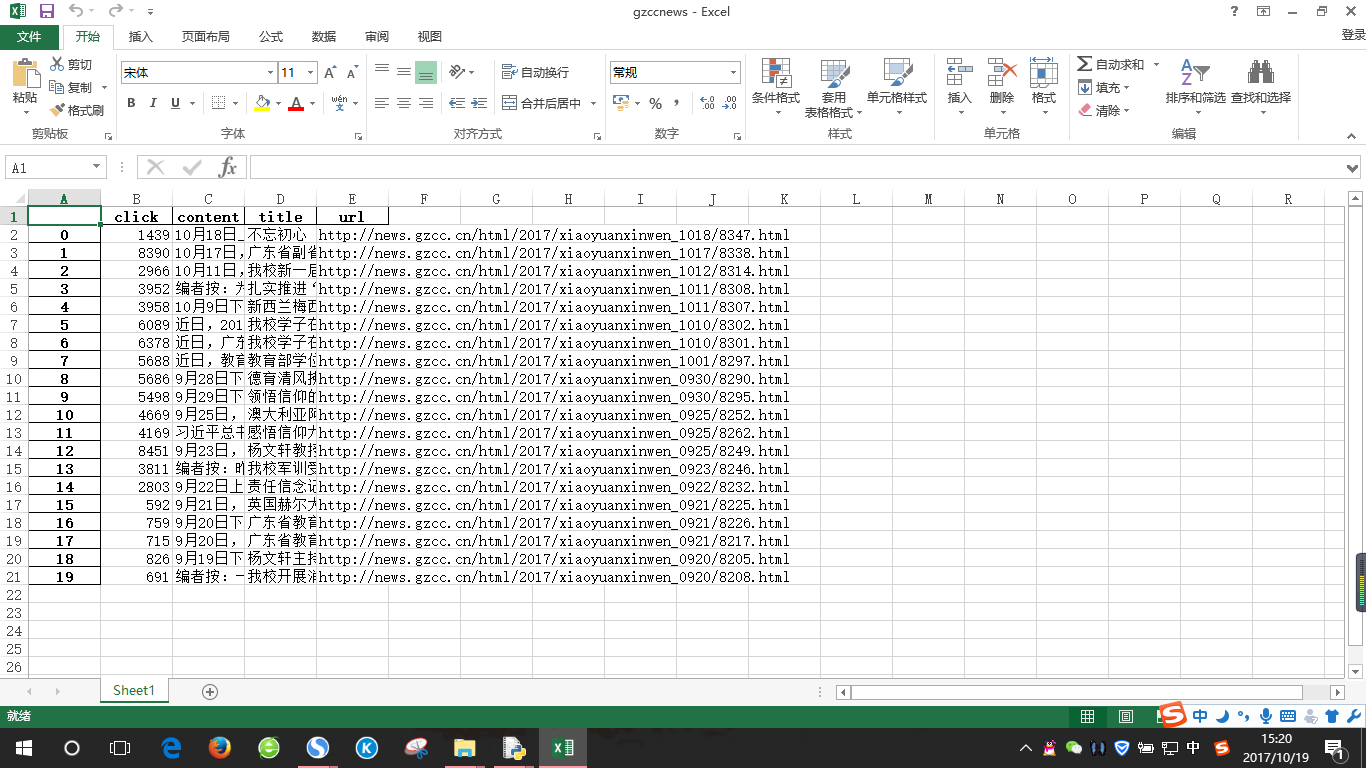1.结构化:
- 单条新闻的详情字典:news
- 一个列表页所有单条新闻汇总列表:newsls.append(news)
- 所有列表页的所有新闻汇总列表:newstotal.extend(newsls)
2.转换成pandas的数据结构DataFrame
3.从DataFrame保存到excel
4.从DataFrame保存到sqlite3数据库
import requests from bs4 import BeautifulSoup from datetime import datetime import re import pandas import sqlite3 def getclick(url):#给定单条新闻链接,返回点击次数 id=re.search('_(.*).html',url).group(1).split('/')[1] clickurl='http://oa.gzcc.cn/api.php?op=count&id={}&modelid=80'.format(id) click=int(requests.get(clickurl).text.split('.')[-1].lstrip("html('").rstrip("');")) return click def getdetail(url):#给定单条新闻链接,返回新闻细节的字典 resd=requests.get(url) resd.encoding='utf-8' soupd=BeautifulSoup(resd.text,'html.parser') news={} news['title']=soupd.select('.show-title')[0].text news['url']=url info=soupd.select('.show-info')[0].text #news['dt']=datetime.strptime(info.lstrip('发布时间:')[0:19],'%Y-%m-%d %H:%M:') #news['source']=re.search('来源:(.*)点击',info).group(1).strip() news['content']=soupd.select('.show-content')[0].text.strip() news['click']=getclick(url) return(news) def onepage(pageurl):#给定新闻列表页的链接,返回该页所有新闻细节字典的列表 res=requests.get(pageurl) res.encoding='utf-8' soup = BeautifulSoup(res.text,'html.parser') newsls=[] for news in soup.select('li'): if len(news.select('.news-list-title'))>0: newsls.append(getdetail(news.select('a')[0]['href'])) return(newsls) ns=[] gzccurl='http://news.gzcc.cn/html/xiaoyuanxinwen/' ns.extend(onepage(gzccurl)) res=requests.get(gzccurl) res.encoding='utf-8' soup = BeautifulSoup(res.text,'html.parser') pages=int(soup.select('.a1')[0].text.rstrip('条'))//10+1#新闻列表页的总页数 for i in range(2,3): listurl='http://news.gzcc.cn/html/xiaoyuanxinwen/{}.html'.format(i) ns.extend(onepage(listurl))#后面的每一个列表页 df=pandas.DataFrame(ns)#转换成pandas的数据结构DataFrame print(df.head()) df.to_excel('gzccnews.xlsx')#从DataFrame保存到excel with sqlite3.connect('gzccnewsdbl.sqlite')as db:#从DataFrame保存到sqlite3数据库 df.to_sql('gzccnewsdb1',con=db)

